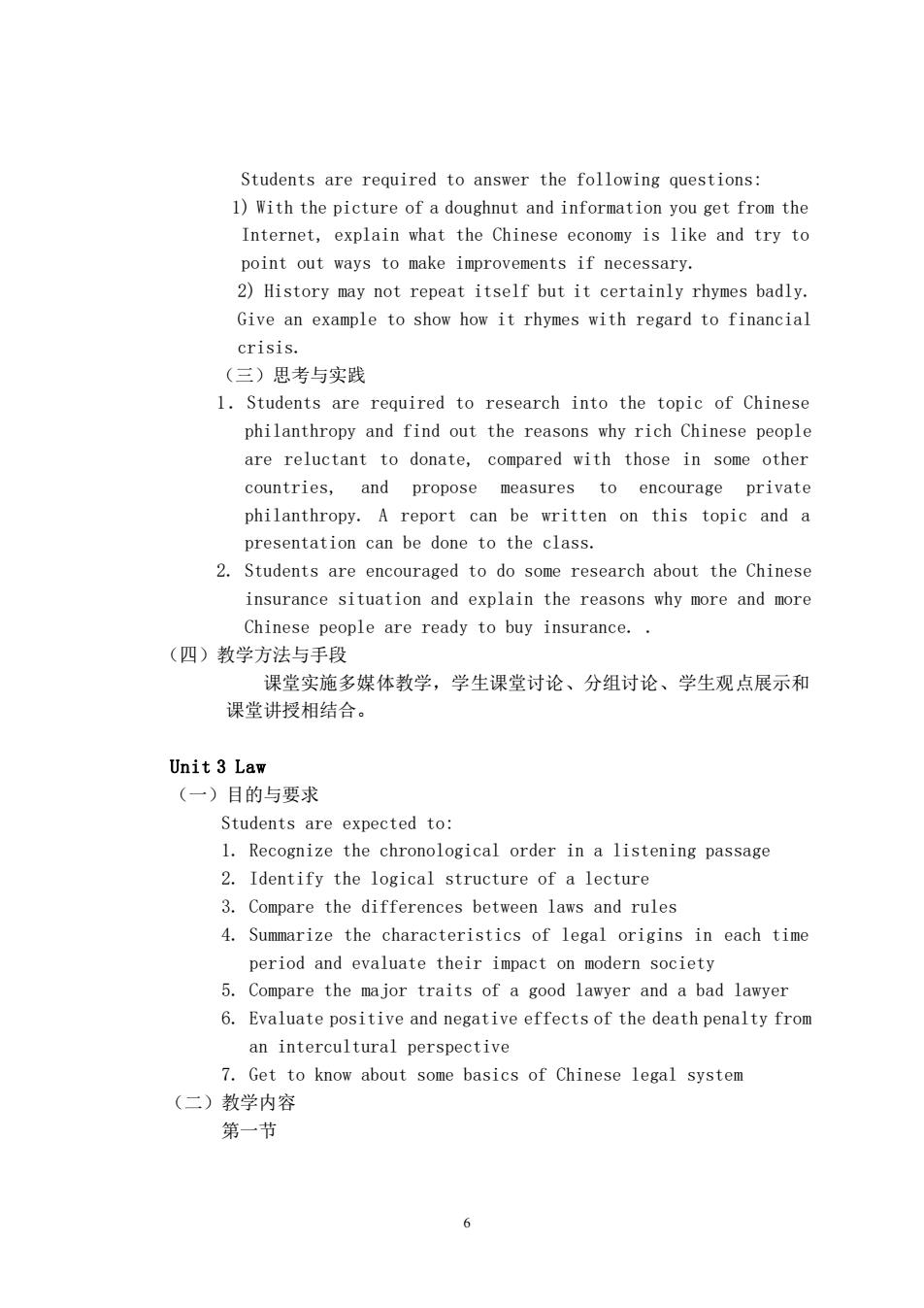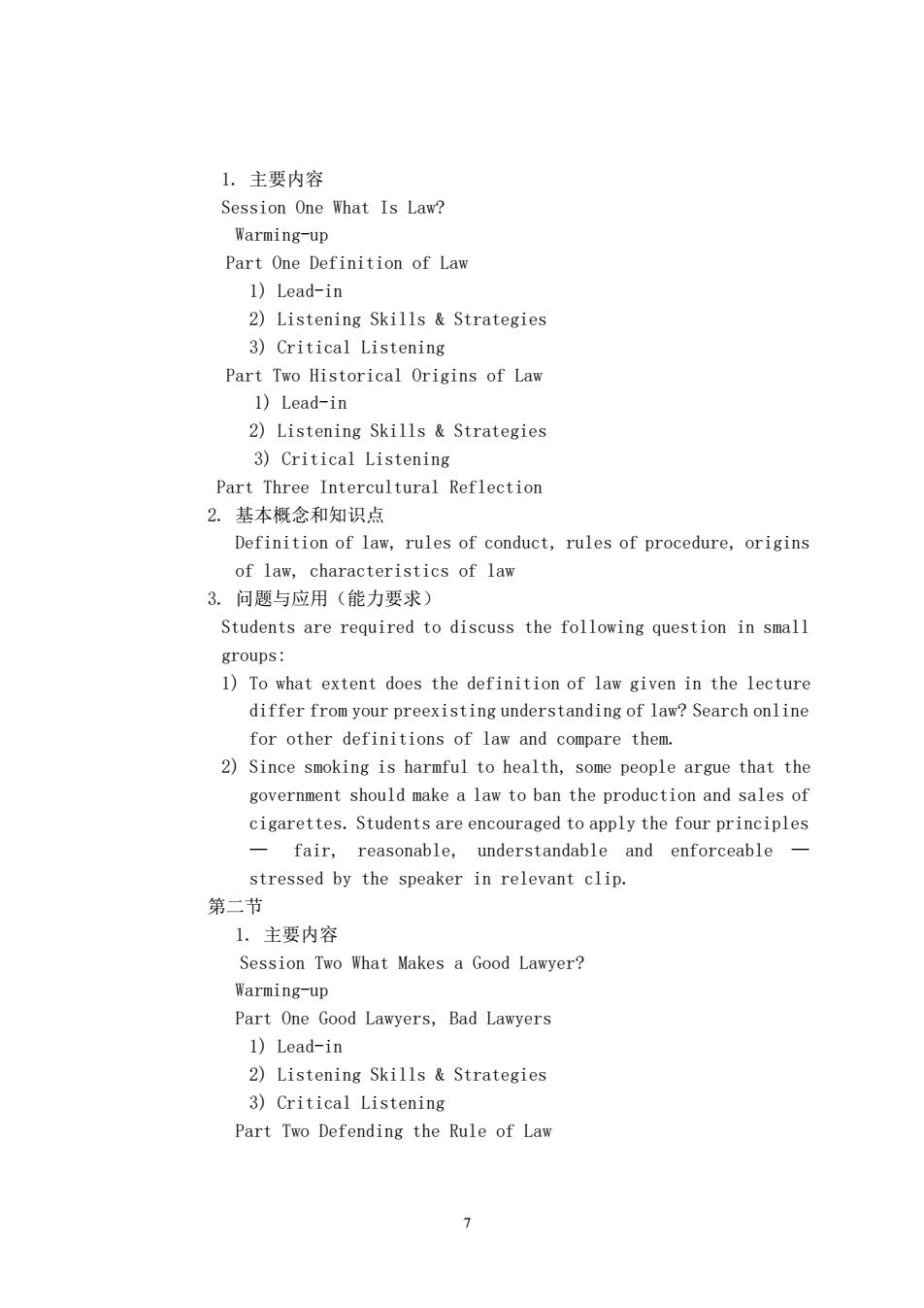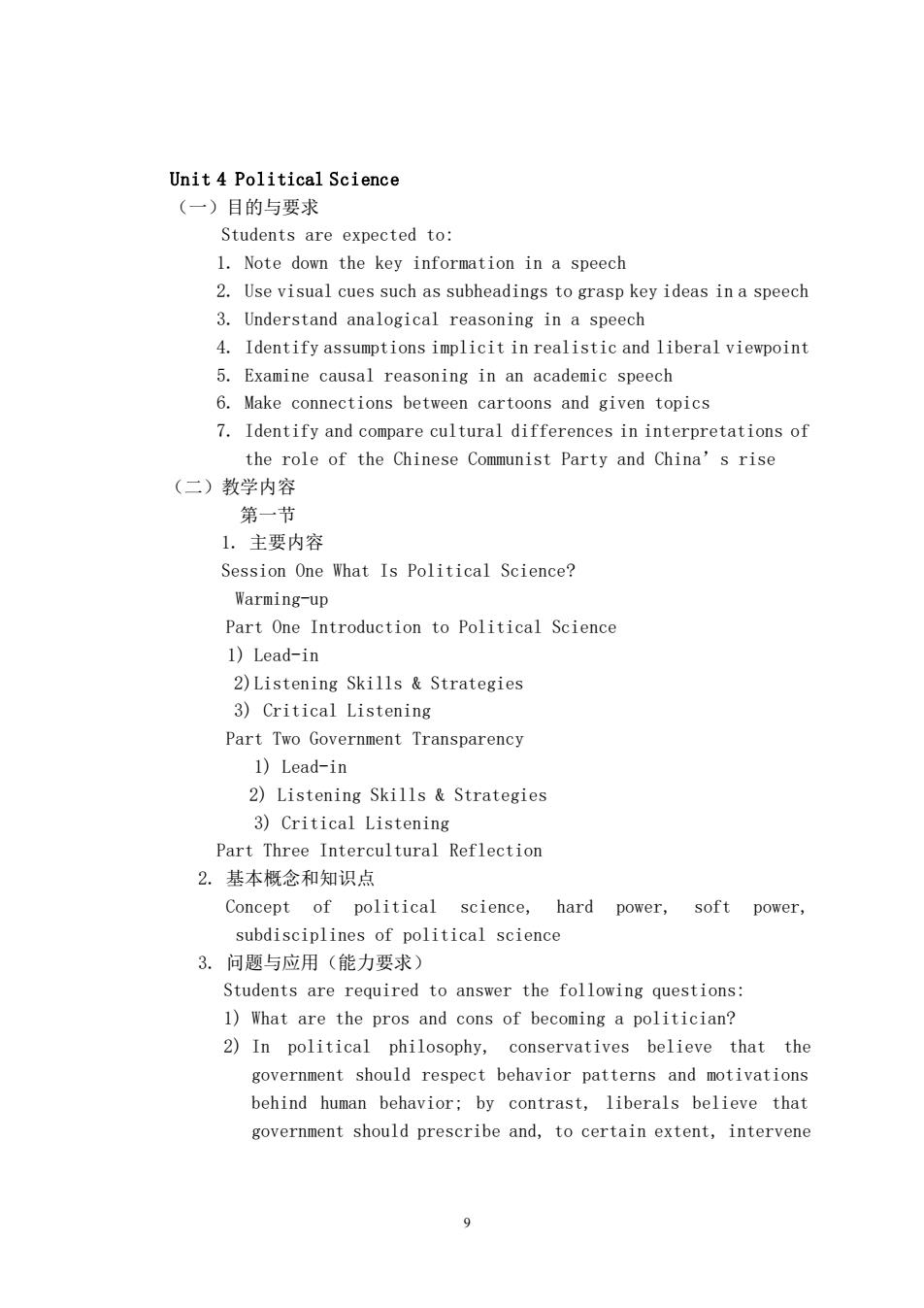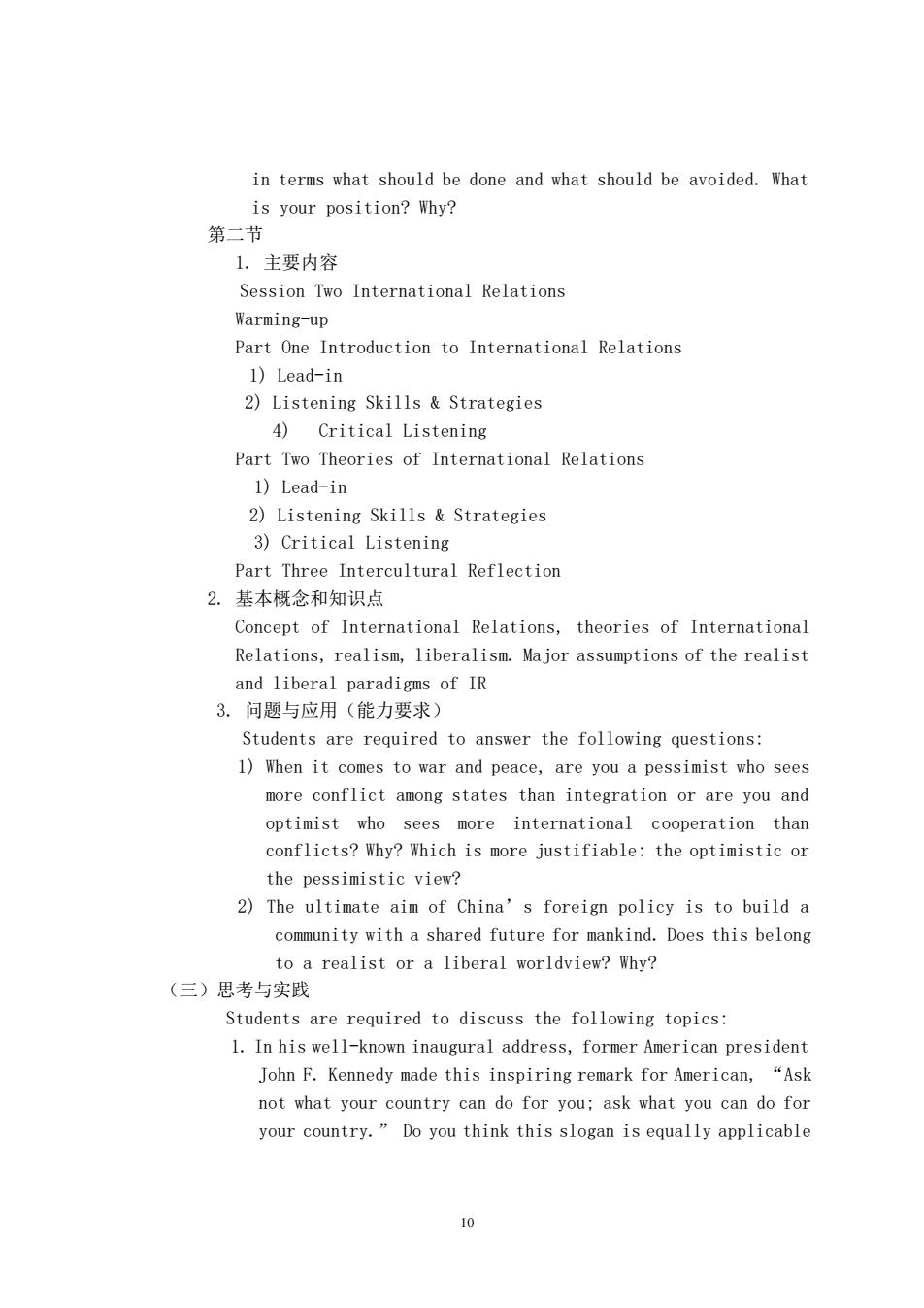
Students are required to answer the following questions: 1)With the picture of a doughnut and information you get from the Internet,explain what the Chinese economy is like and try to point out ways to make improvements if necessary. 2)History may not repeat itself but it certainly rhymes badly. Give an example to show how it rhymes with regard to financial crisis. (三)思考与实践 1.Students are required to research into the topic of Chinese philanthropy and find out the reasons why rich Chinese people are reluctant to donate,compared with those in some other countries,and propose measures to encourage private philanthropy.A report can be written on this topic and a presentation can be done to the class. 2.Students are encouraged to do some research about the Chinese insurance situation and explain the reasons why more and more Chinese people are ready to buy insurance. (四)教学方法与手段 课堂实施多媒体教学,学生课堂讨论、分组讨论、学生观点展示和 课堂讲授相结合。 Unit 3 Law (一)目的与要求 Students are expected to: 1.Recognize the chronological order in a listening passage 2.Identify the logical structure of a lecture 3.Compare the differences between laws and rules 4.Summarize the characteristics of legal origins in each time period and evaluate their impact on modern society 5.Compare the major traits of a good lawyer and a bad lawyer 6.Evaluate positive and negative effects of the death penalty from an intercultural perspective 7.Get to know about some basics of Chinese legal system (二)教学内容 第一节 6
6 Students are required to answer the following questions: 1) With the picture of a doughnut and information you get from the Internet, explain what the Chinese economy is like and try to point out ways to make improvements if necessary. 2) History may not repeat itself but it certainly rhymes badly. Give an example to show how it rhymes with regard to financial crisis. (三)思考与实践 1.Students are required to research into the topic of Chinese philanthropy and find out the reasons why rich Chinese people are reluctant to donate, compared with those in some other countries, and propose measures to encourage private philanthropy. A report can be written on this topic and a presentation can be done to the class. 2. Students are encouraged to do some research about the Chinese insurance situation and explain the reasons why more and more Chinese people are ready to buy insurance. . (四)教学方法与手段 课堂实施多媒体教学,学生课堂讨论、分组讨论、学生观点展示和 课堂讲授相结合。 Unit 3 Law (一)目的与要求 Students are expected to: 1. Recognize the chronological order in a listening passage 2. Identify the logical structure of a lecture 3. Compare the differences between laws and rules 4. Summarize the characteristics of legal origins in each time period and evaluate their impact on modern society 5. Compare the major traits of a good lawyer and a bad lawyer 6. Evaluate positive and negative effects of the death penalty from an intercultural perspective 7. Get to know about some basics of Chinese legal system (二)教学内容 第一节

1.主要内容 Session One What Is Law? Warming-up Part One Definition of Law 1)Lead-in 2)Listening Skills Strategies 3)Critical Listening Part Two Historical Origins of Law 1)Lead-in 2)Listening Skills Strategies 3)Critical Listening Part Three Intercultural Reflection 2.基本概念和知识点 Definition of law,rules of conduct,rules of procedure,origins of law,characteristics of law 3.问题与应用(能力要求) Students are required to discuss the following question in small groups: 1)To what extent does the definition of law given in the lecture differ from your preexisting understanding of law?Search online for other definitions of law and compare them. 2)Since smoking is harmful to health,some people argue that the government should make a law to ban the production and sales of cigarettes.Students are encouraged to apply the four principles fair,reasonable,understandable and enforceable stressed by the speaker in relevant clip. 第二节 1.主要内容 Session Two What Makes a Good Lawyer? Warming-up Part One Good Lawyers,Bad Lawyers 1 Lead-in 2)Listening Skills Strategies 3)Critical Listening Part Two Defending the Rule of Law
7 1. 主要内容 Session One What Is Law? Warming-up Part One Definition of Law 1) Lead-in 2) Listening Skills & Strategies 3) Critical Listening Part Two Historical Origins of Law 1) Lead-in 2) Listening Skills & Strategies 3) Critical Listening Part Three Intercultural Reflection 2. 基本概念和知识点 Definition of law, rules of conduct, rules of procedure, origins of law, characteristics of law 3. 问题与应用(能力要求) Students are required to discuss the following question in small groups: 1) To what extent does the definition of law given in the lecture differ from your preexisting understanding of law? Search online for other definitions of law and compare them. 2) Since smoking is harmful to health, some people argue that the government should make a law to ban the production and sales of cigarettes. Students are encouraged to apply the four principles — fair, reasonable, understandable and enforceable — stressed by the speaker in relevant clip. 第二节 1. 主要内容 Session Two What Makes a Good Lawyer? Warming-up Part One Good Lawyers, Bad Lawyers 1) Lead-in 2) Listening Skills & Strategies 3) Critical Listening Part Two Defending the Rule of Law

l)Lead-in 2)Listening Skills Strategies 3)Critical Listening Part Three Intercultural Reflection 2.基本概念和知识点 Qualities of good lawyer 3.问题与应用(能力要求) Students are required to discuss the following question in small groups: Going to law school and becoming a lawyer used to be seen as a golden ticket to career and financial success in the United States But today few lawyers believe this actually to be the case.In a Gallup poll of over 4,000 American adults who earned a postgraduate degree between 2000 and 2015,just 23%of law school graduates said that their education was worth the cost and only 20%said their schooling prepared them well for postgraduate life. Is it the same case in China?What do you think about the value of higher education in general? (三)思考与实践 1.Students are required to search online for information about laws prescribing or banning the death penalty in different countries. Consider such questions as what the pros and cons of the death penalty are,and whether the death penalty be retained in China Write a report on this issue. 2.School bullying is a common occurrence.The United States has an anti-bullying law to prevent school bullying.Preventive measures against school bullying in China usually include increasing surveillance,offering bullying awareness classes for both students and parents etc.Students are required to find out more anti-bullying measures in China and decide whether China should implement an anti-bullying law. (四)教学方法与手段 课堂实施多媒体教学,学生课堂讨论、分组讨论、学生观点展示和 课堂讲授相结合
8 1) Lead-in 2) Listening Skills & Strategies 3) Critical Listening Part Three Intercultural Reflection 2. 基本概念和知识点 Qualities of good lawyer 3. 问题与应用(能力要求) Students are required to discuss the following question in small groups: Going to law school and becoming a lawyer used to be seen as a golden ticket to career and financial success in the United States. But today few lawyers believe this actually to be the case. In a Gallup poll of over 4,000 American adults who earned a postgraduate degree between 2000 and 2015, just 23% of law school graduates said that their education was worth the cost and only 20% said their schooling prepared them well for postgraduate life. Is it the same case in China? What do you think about the value of higher education in general? (三)思考与实践 1. Students are required to search online for information about laws prescribing or banning the death penalty in different countries. Consider such questions as what the pros and cons of the death penalty are, and whether the death penalty be retained in China. Write a report on this issue. 2. School bullying is a common occurrence. The United States has an anti-bullying law to prevent school bullying. Preventive measures against school bullying in China usually include increasing surveillance, offering bullying awareness classes for both students and parents etc. Students are required to find out more anti-bullying measures in China and decide whether China should implement an anti-bullying law. (四)教学方法与手段 课堂实施多媒体教学,学生课堂讨论、分组讨论、学生观点展示和 课堂讲授相结合

Unit 4 Political Science (一)目的与要求 Students are expected to: 1.Note down the key information in a speech 2.Use visual cues such as subheadings to grasp key ideas in a speech 3.Understand analogical reasoning in a speech 4.Identify assumptions implicit in realistic and liberal viewpoint 5.Examine causal reasoning in an academic speech 6.Make connections between cartoons and given topics 7.Identify and compare cultural differences in interpretations of the role of the Chinese Communist Party and China's rise (二)教学内容 第一节 1.主要内容 Session One What Is Political Science? Warming-up Part One Introduction to Political Science 1 Lead-in 2)Listening Skills Strategies 3)Critical Listening Part Two Government Transparency 1)Lead-in 2)Listening Skills&Strategies 3)Critical Listening Part Three Intercultural Reflection 2.基本概念和知识点 Concept of political science,hard power,soft power, subdisciplines of political science 3.问题与应用(能力要求 Students are required to answer the following questions: 1)What are the pros and cons of becoming a politician? 2)In political philosophy,conservatives believe that the government should respect behavior patterns and motivations behind human behavior:by contrast,liberals believe that government should prescribe and,to certain extent,intervene 9
9 Unit 4 Political Science (一)目的与要求 Students are expected to: 1. Note down the key information in a speech 2. Use visual cues such as subheadings to grasp key ideas in a speech 3. Understand analogical reasoning in a speech 4. Identify assumptions implicit in realistic and liberal viewpoint 5. Examine causal reasoning in an academic speech 6. Make connections between cartoons and given topics 7. Identify and compare cultural differences in interpretations of the role of the Chinese Communist Party and China’s rise (二)教学内容 第一节 1. 主要内容 Session One What Is Political Science? Warming-up Part One Introduction to Political Science 1) Lead-in 2)Listening Skills & Strategies 3) Critical Listening Part Two Government Transparency 1) Lead-in 2) Listening Skills & Strategies 3) Critical Listening Part Three Intercultural Reflection 2. 基本概念和知识点 Concept of political science, hard power, soft power, subdisciplines of political science 3. 问题与应用(能力要求) Students are required to answer the following questions: 1) What are the pros and cons of becoming a politician? 2) In political philosophy, conservatives believe that the government should respect behavior patterns and motivations behind human behavior; by contrast, liberals believe that government should prescribe and, to certain extent, intervene

in terms what should be done and what should be avoided.What is your position?Why? 第二节 1.主要内容 Session two international relations Warming-up Part One Introduction to International Relations 1)Lead-in 2)Listening Skills Strategies 4)Critical Listening Part Two Theories of International Relations 1 Lead-in 2)Listening Skills Strategies 3)Critical Listening Part Three Intercultural Reflection 2.基本概念和知识点 Concept of International Relations,theories of International Relations,realism,liberalism.Major assumptions of the realist and liberal paradigms of IR 3.问题与应用(能力要求) Students are required to answer the following questions: 1)When it comes to war and peace,are you a pessimist who sees more conflict among states than integration or are you and optimist who sees more international cooperation than conflicts?Why?Which is more justifiable:the optimistic or the pessimistic view? 2)The ultimate aim of China's foreign policy is to build a community with a shared future for mankind.Does this belong to a realist or a liberal worldview?Why? (三)思考与实践 Students are required to discuss the following topics: 1.In his well-known inaugural address,former American president John F.Kennedy made this inspiring remark for American,"Ask not what your country can do for you:ask what you can do for your country.Do you think this slogan is equally applicable 10
10 in terms what should be done and what should be avoided. What is your position? Why? 第二节 1. 主要内容 Session Two International Relations Warming-up Part One Introduction to International Relations 1) Lead-in 2) Listening Skills & Strategies 4) Critical Listening Part Two Theories of International Relations 1) Lead-in 2) Listening Skills & Strategies 3) Critical Listening Part Three Intercultural Reflection 2. 基本概念和知识点 Concept of International Relations, theories of International Relations, realism, liberalism. Major assumptions of the realist and liberal paradigms of IR 3. 问题与应用(能力要求) Students are required to answer the following questions: 1) When it comes to war and peace, are you a pessimist who sees more conflict among states than integration or are you and optimist who sees more international cooperation than conflicts? Why? Which is more justifiable: the optimistic or the pessimistic view? 2) The ultimate aim of China’s foreign policy is to build a community with a shared future for mankind. Does this belong to a realist or a liberal worldview? Why? (三)思考与实践 Students are required to discuss the following topics: 1. In his well-known inaugural address, former American president John F. Kennedy made this inspiring remark for American, “Ask not what your country can do for you; ask what you can do for your country.” Do you think this slogan is equally applicable